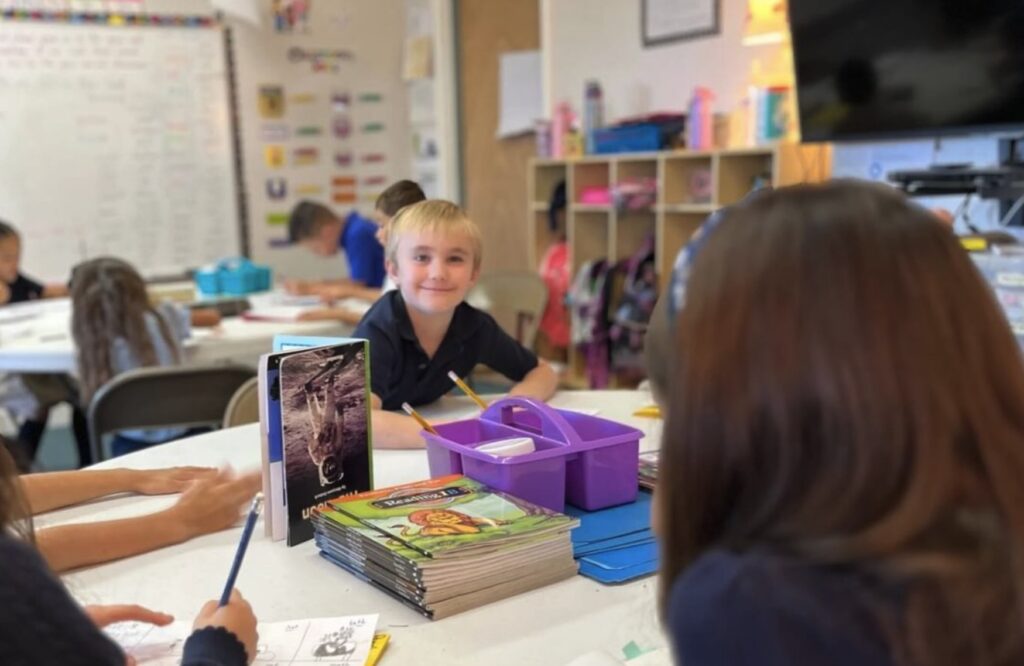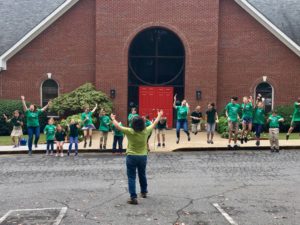SchoolBox is launching schools, changing Christian educational landscape
It’s growing by leaps and bounds, with no end in sight.
SchoolBox, an online program of the Herzog Foundation to help founders launch new Christian schools, has seen more than 260 schools start…

It’s growing by leaps and bounds, with no end in sight.
SchoolBox, an online program of the Herzog Foundation to help founders launch new Christian schools, has seen more than 260 schools start in the last two years, with many more in the works.
It’s touched 43 states so far, the District of Columbia and even several other countries, part of the boom of new Christian school startups that has accelerated since 2020 as churches and individuals take back control of what their children are learning.
“Every day new groups are signing into SchoolBox and they’re launching new schools,” says Darrell Jones, Herzog Foundation president. “It’s exciting to see how school launch groups across the country are finding the value that SchoolBox brings.”
Jones and Herzog set out to standardize the steps necessary to start a Christian school. After consulting with a team of experts, they came up with eight core steps, which were then incorporated into the eight modules of SchoolBox.
Participants work at their own pace, taking the courses online and consulting with a mentor, which Herzog pays for, to implement best practices to start their school (Herzog doesn’t sponsor mentors outside the U.S., although participants can still work through the program free of charge).
Fostering creativity
While SchoolBox’s steps are standardized, the types of schools and associated training are totally customized.
“We’ve seen a ton of really innovative ideas,” says Jonathan Edmondson, who manages the program for Herzog, which publishes The Lion. “You have microschools, one-room schoolhouses, one-day-a-week programs, two-day-a-week programs, home school cooperatives.
“A lot of folks are saying that the five-day-a-week, age- and grade-segregated model doesn’t have to be what they want for their kids. They’re willing to do things mixed-age, experimental learning, project-based learning, outdoor experiences, which is really cool to see.”
Churches, parents and educators use the program to learn how to build a team, determine their market and clarify their vision. Other steps include registering as a legal entity and attracting students and parents. SchoolBox has streamlined a process others have found daunting.
From ‘overwhelmed’ to successful launch
Christy DeVigili of Florida learned about the program after her own efforts “overwhelmed” a church she was trying to help start a school.
“I gave the pastor a stack of papers with all of the things I needed answers to in order to help them, and I just saw the look of being completely overwhelmed on her face,” she says. “I walked away from that meeting and I didn’t hear from them and I got kind of bummed. Then we got introduced to SchoolBox and I was like ‘Oh, they would have loved this.’”
DeVigili, who heads the microschools division of the Florida Citizens Alliance, went on to help launch another school using SchoolBox’s training, but the previous story has a happy ending: a testimony from the successful school launch got back to the first church, which reached back out to her. She signed on as mentor, took the church through SchoolBox, and launched another school this fall. The momentum keeps building.
“Because of them, word got around to another church in Marco Island, which is close to the end (of Florida),” DeVigili says. “Word just started spreading of how easy this program is to use, how excellent it is. And when you pair it with a mentor from Florida Citizens Alliance, it really just makes the whole process of starting one of these non-traditional learning environments not only doable, but easy.”
The alliance wants to plant microschools in every church in Florida. It’s started 17 so far and will soon be in every geographic region of the Sunshine State.
DeVigili says her organization “couldn’t do what we do without the Herzog Foundation and SchoolBox.
“I don’t even think we’re going to understand how much of an impact SchoolBox has had until we’re like five years down the road,” she says. “It took a movement to create the public school system many years ago. What Herzog and SchoolBox are doing is exactly what our society needs to really reform education by bringing more competition into the marketplace. SchoolBox gives the average person the tools and the confidence they need to start one of these schools, and that is what’s going to change the educational landscape forever.”
Spreading Charlotte Mason
SchoolBox’s largest partner is the Charlotte Mason Institute (CMI), which it has helped launch 20 schools with another four in the works. Lisa Ector, a CMI board member who focuses on teacher training and school support, says she was “blown away,” when she learned what SchoolBox offered.
“I’d been saying for years that we needed a packet we could hand to people saying ‘These are the steps. This is what you do to start a school,’” she says. “We all knew we needed that, but no one had the time to do it. When I found out there was a SchoolBox program that had eight courses to take people from step one to launch, I was just so excited. And on top of that, they pay for a mentor to walk alongside and meet with people as they go through the course.”
Ector likes how thorough the program is.
Participants are “thinking through every step of the way, even things they thought they had already taken care of or done,” says Ector, who is also a SchoolBox mentor. “It just makes them think more deeply through every step: their mission, their vision and how they’re going to onboard parents. It’s a pleasure as a mentor to do it. It’s just been an incredible program.”
Deani Van Pelt, CMI board chairman, says her organization had created a program called Alveary eight years ago to promote Charlotte Mason’s educational methods. It was popular with home educators but SchoolBox has increased its presence in classroom-based settings.
“We’ve been able to reach and to scale our products and services to a much larger audience,” she says. “The timing could not have been better: more and more people were moving from independently offering a home-based education to moving towards more collaborative, out-of-system forms of education, and therefore wanting to start small schools.”
SchoolBox is “giving confidence to the sector as a whole,” adds Van Pelt, who lives in Canada and heads an association of Christian schools there. “You’re freeing organizations up to do what they do best: you’re doing the heavy lifting on the standard items and allowing each organization and each school to pursue its unique vision and version of Christian education. In our case it’s the Charlotte Mason approach.”
Making it Work
SchoolBox participants work the course at their own pace. Some do it in just a few months, others take a year or more depending on their needs.
“We saw a micro school complete the program within a month and then launch their school two months later,” Edmondson says. “So it just depends on the motivation of the group, how quickly they want to go through the process, how united they are and some of the decisions that need to be made.”
After registering at hfschoolbox.com and completing an initial step, participants are assigned a mentor from a school similar to the type they are trying to start.
For Jarrod Herald, who started Foundation Christian Academy out of Victory Church in Bloomington, Illinois, that meant getting linked to a former teacher from the state who now leads a school in Missouri that was birthed out of a church.
“Their church is just like Victory Church, and the heart that they have for their school is very similar to ours as well, very generational minded,” says Herald, Victory’s executive pastor and Foundation’s head of school. “To have that ‘matchmaking’ is extremely helpful because it’s just added encouragement that there’s somebody out there that now has a school of 400 or 500 students with 40 or 50 people on staff that’s likeminded with what your church believes and they’re going to help you very openly along the way. It’s been a blessing.”
Participants take action steps after each module and meet with their mentor to discuss it and their next steps, a process that repeats throughout the course.
“It’s a very structured process,” Edmondson says. “Our goal is that by doing it that way, folks can have a more informed conversation as they’re going through the course.”
Herald appreciates the detailed guidance.
“SchoolBox has been one of those incredible tools of ‘here’s the process to start getting things organized. Here’s the information about the school board. Here’s the legal stuff. Here’s the financial things that you need to deal with insurance. Here’s a mentor that you can meet over Zoom or over phone calls and emails to help encourage you and talk through things. It’s been totally a blessing to have that kind of resource in our corner to help us through this process of launching and breaking ground on a school.”
Future Plans
With all the growth, SchoolBox has already had an impact, but it is expanding its horizons.
It launched a similar program this spring called HF Homeschool to guide families through the same eight steps to start a homeschool co-op or community. It’s also building a SchoolBox Network to potentially provide ongoing mentorship and strategic planning to schools that have started, Edmondson says.
The growth in Christian education is real but there are obstacles. Edmondson says the two greatest barriers schools face are a lack of students or a lack of a place to meet. For that, he issues “a challenge to churches.
“They already have a facility and generally have children as part of the community,” he says. “Only about 30% of the schools we’ve launched are part of a church. There’s room in the church to host Christian schools, Christian education or homeschools for their congregation.”
Herald agrees, posing a question to other church leaders:
“What is the square footage of your facility and how much are you using throughout the week, or is it just sitting there as empty real estate?” he asks. “If your building is sitting empty all week long and you’re paying for HVAC and water utility, you need to consider what the Holy Spirit would speak to you about a private school, whether that’s a preschool or just doing kindergarten or a life-skills situation. You need to consider it because it’s an opportunity to share the gospel and make an impact.
“I believe the Lord is calling his church to do this because these little souls are worth saving and it’s time for pastors and leaders to step up and do something.”
To learn more about SchoolBox and HF Homeschool, visit hfschoolbox.com.



